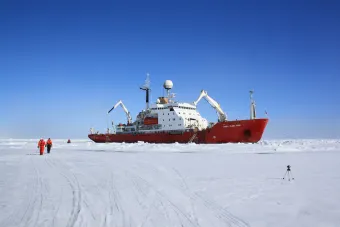
On 9 May 2018, National Oceanography Centre (NOC) scientists will set sail towards the Fram Strait, between Greenland and Svalbard, as part of the ARISE project, which will investigate the impact of warming on the Arctic food chain. ARISE forms part of the £16 million, UK flagship Changing Arctic Ocean programme of Arctic research.
With warmer winters across the polar region, the Arctic Ocean is now experiencing year-on-year record lows of sea ice. These changes are having an unprecedented impact on how the Arctic ecosystem operates. Changes to the lower part of the food chain are a serious concern because this is dominated by one type of zooplankton (copepods - small crustaceans the size of a rice grain). As fish and other species rely on zooplankton for their main source of food, the Arctic food chain is precarious in the face of climate change and susceptible to dynamic change.
Ahead of the research ship departing, NOC scientist Dr Jo Hopkins, who will be on board as part of ARISE, said “Spring is an exciting time of year to be going to the Arctic. The seasonal ice cover is just starting to retreat, exposing the surface waters to daylight and triggering growth of phytoplankton. Being so early in the season, however, means that much of the Fram Strait and East Greenland shelf are still tricky to reach through the ice. Typically, research expeditions to this area wait until August and September when the ice has retreated as far north as possible. What we learn about the base of the food chain at this time of year and the life that it supports will be particularly valuable.”
The ARISE project leader, Dr Claire Mahaffey from the University of Liverpool, said: “It is important to understand how the Arctic Ocean is responding to a changing environment, and it is vital we are able to detect change to the Arctic ecosystem above natural ecosystem variability. Overall, ARISE will use a combination of biological markers at the base of the food chain and in Arctic seals, alongside seal population ecology and mathematical models, to develop a new framework to detect long term change in the Arctic ecosystem. During the expedition to the Fram Strait, we will capture the biomarker signals at the base of the food chain during a key transition period from winter to spring in the Arctic. The ARISE team will be busy collecting large quantities of seawater, phytoplankton and zooplankton for biomarker analysis back in our laboratories.”
There will also be on-board scientists investigating how zooplankton are coping with a warming Arctic Ocean as part of the DIAPOD project. Scientists from both projects will collect zooplankton samples and examine them to check how healthy the animals are. The environments the zooplankton live in will also be investigated by sampling the water column for its chemical composition and by looking at seafloor sediments using a camera.
Professor David Pond, from the University of Stirling and lead investigator of the DIAPOD project, is the Principal Scientific Officer on the expedition: “We have a busy and exciting schedule of science ahead of us. We will use specialised nets to catch the zooplankton from the surface down to depths of 2 km in the Fram Strait region. We will be conducting on-board experiments to study how environmental change is impacting on these animals. We’re particularly interested in understanding if this key Arctic food source is showing signs of change in its behaviour or abundance.”
Science Minister Sam Gyimah said: “Climate change has a devastating effect on our planet, from melting polar ice caps to rising sea levels and I am proud the UK is leading the way in tackling this harm. World-class researchers from 18 different UK institutes will be undertaking this vitally important work and through our modern Industrial Strategy we have committed to investing 2.4% of GDP on research and development to help tackle major global challenges.”
The ultimate goal of Changing Arctic Oceans is to generate a better understanding of the Arctic so models can more accurately predict future change to the environment and the ecosystem. Within the programme there are four main projects with more than 80 scientists combined, from 18 UK research institutes.
The four projects cover different aspects of the Programme’s goals: how change in the Arctic is affecting the food chain, from small organisms at the bottom to large predators at the top (ARISE), how warming influences the single main food source at the bottom of the food chain (DIAPOD), the effect of retreating and thinning sea ice on nutrients and sea life in the surface ocean (Arctic PRIZE) and on the ecosystem at the seafloor (ChAOS).
Follow ARISE on twitter @project_ARISE or watch a video of Jo talking through the expedition ahead of its departure.